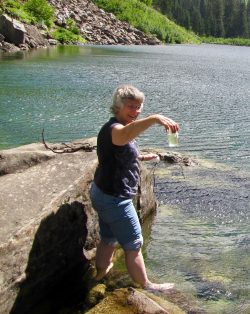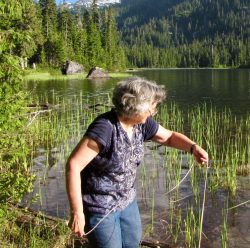by Peg Wendling, Department of Public Works, City of Bellingham

Dr. Matthews collecting an algae sample at Coal Lake. (photo by Geoff Matthews)
If the ultimate finale to a career in limnology is to swim off into the sunset, then the wake left behind by Dr. Robin Matthews will be a sight to behold. At the end of this year, Robin leaves her post as the Director of Western Washington University’s Institute for Watershed Studies. Of her many accomplishments, one that will leave an enduring mark started with her taking a sporadic lake monitoring program on Lake Whatcom, Bellingham’s drinking water source, and turning it into a comprehensive body of work. This research has contributed greatly to lake protection efforts–a legacy that will benefit Bellingham indefinitely.
Perhaps subtly influenced by the call of Flathead Lake while she worked summers at her family’s cherry orchard, Robin started her limnologic pursuits in a time when awareness of environmental issues was limited. She was a graduate of Indiana University’s newly created School of Public and Environmental Affairs, later getting a PhD at Virginia Tech in Botany and Freshwater Ecology. In the early 80’s she worked for Dupont and did some consulting before finding a good fit at the Institute for Watershed Studies. The Institute’s Mike Hilles and Joan Pickens have worked alongside Robin for decades and remark: “Robin has been the heart and soul of our Institute, and we have the highest respect for her. Her extraordinary dedication and kind leadership have provided the stage for a wealth of studies that were produced during her tenure. We respect her and are grateful to her for steering the ship wisely and always staying on course.”
The importance of preserving water quality meant for consumption cannot be disputed, though when this water source is also located in a multi-use watershed, it is surprising how complicated things can get. Through years of monitoring and data analysis, Dr. Matthews’ conclusions commanded attention by providing Bellingham with evidence of urbanization’s negative impacts on Lake Whatcom. Scientists are not immune from the slings and arrows of detractors, and the former superintendent of the water utility, Bill McCourt, remembers: “Robin had to endure years where her work would be criticized by vocal groups not willing to believe that Lake Whatcom was becoming more productive. She always handled herself with grace, and the data generated was impeccable, which garnered my respect.”
A comprehensive, multi-jurisdictional lake management program has been the direct result of Robin’s scientific work. It is a testament to what good limnologic studies can inspire, and what a 40-year career in limnology can achieve. Robin leaves behind a cadre of students moving the profession forward, and a legacy of lake protection for Lake Whatcom. The citizens of Bellingham owe a debt of gratitude and lift a glass of clean drinking water to Robin as a thank you for her many endeavors. Cheers!



